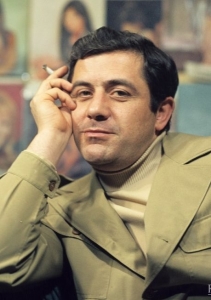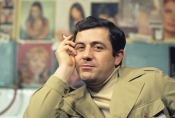Zbigniew Zapasiewicz

“I make use of the transformation of my appearance. Not to mention internal transformation and characteristics, which I always seek. I'm trying to find out, for example, how the man I am playing walks, how he talks. I'm trying (for my own use, because the viewer may not even notice it) to invent my own way of speaking for every character. I love it,” the actor confesses in the book Zapasowe maski (2009).
He was born on September 13, 1934 in Warsaw, died on July 14, 2009 in Warsaw. He studied at the Faculty of Chemistry of Warsaw University of Technology (1951-1952); graduate of the Acting Department of the State Higher School of Theatre in Warsaw (1956). He worked in a number of theatres in the capital. He also directed plays and taught classes.
He appeared in nearly eighty feature films and television series and did voice-overs in more than thirty documentaries and animated films. His first television series Stawka większa niż życie/More Than Life at Stake (1968), his first feature film – Wiano/Dowry (1963) by Jan Łomnicki. He received his first rave reviews for his role as the associate professor in the TV film Za ścianą/Behind the Wall (1971) by Krzysztof Zanussi, in which he co-starred with Maja Komorowska. He was also an associate professor in Edward Żebrowski's debut Ocalenie/Salvation (1972), once again alongside Maja Komorowska. This degree stuck to him for a long time, and his performance as the associate professor confronting his own cynical attitude with that of the young, idealistic junior lecturer in Barwy ochronne/Camouflage (1976) by Zanussi won him the best actor award at the Gdansk festival (1977). His role as Tomasz Berg, the protagonist of Życie jako śmiertelna choroba przenoszona drogą płciową/Life As A Fatal Sexually Transmitted Disease (2000) by Zanussi, was also honoured with the “Eagle” award (2001) as well as laurels at the Santa Monica festival (2001). Tomasz Berg, a sixty-year-old doctor, learns that he has cancer. He intends to fight. When it turns out he cannot win against death, he decides to accept it. How to live, how to prepare for one’s death, how to find God – such are the fundamental questions posed by Zanussi’s film. It is not just a story about dying, but about returning to religion, regaining hope and faith. Also, it is a story about loneliness.
Zapasiewicz was Zanussi’s favourite actor. The director not only cast him in the roles of “associate professors” – in Z dalekiego kraju/From a Far Country (1981), he portrays Mieczysław Kotlarczyk, founder of the Rhapsodic Theatre, and in Rok spokojnego słońca/Year of the Quiet Sun (1984) – a security service officer. He also gave interesting performances in films by Andrzej Wajda: Kessler in Ziemia obiecana/The Promised Land (1974), and, above all, the famous reporter whose world turns upside down, both professionally and personally in Bez znieczulenia/Rough Treatment (1976). The ambassador in Persona Non Grata (2005) by Zanussi is a character in a similar vein – a man of principles in a world without rules; “of principles” does not mean “without flaws,” however.
Zapasiewicz was a versatile actor. He was perfectly at home in contemporary cinema, but he also created many memorable characters in historical productions, such as King John II Casimir in Mazeppa according to Słowacki, the 1975 adaptation directed by Gustaw Holoubek; Jan Józef Tyssowski, the leader of the Krakow Uprising of 1946, in Pasja/Passion (1977) by Stanisław Różewicz; or Dr. Wiktor Lewen, a pre-war communist in Matka Królów/The Mother of Kings (1982) by Janusz Zaorski.
“From a purely professional point of view, aside from the mastery of technique, it is an actor’s duty to get rid of coquetry, of any penchant for exhibitionism, and to defend every human attitude on stage and screen,” Zapasiewicz said in the monthly “Teatr” (1987).
In 1999, Krystyna Piaseczna made a documentary about him, titled simply Zbigniew Zapasiewicz, and ten years later the actor himself published a book Zapasowe maski [lit. “Backup masks,” a play on his name].
Jerzy Armata
Selected filmography
-
1974
THE PROMISED LAND
reż. Andrzej Wajda
-
1976
CAMOUFLAGE
reż. Krzysztof Zanussi
-
1978
HOSPITAL OF TRANSFIGURATION
reż. Edward Żebrowski
-
1980
FEVER
reż. Agnieszka Holland
-
1981
BLIND CHANCE
reż. Krzysztof Kieślowski
-
1982
THE MOTHER OF KINGS
reż. Janusz Zaorski
-
1992
THE DOGS (THE PIGS)
reż. Władysław Pasikowski




